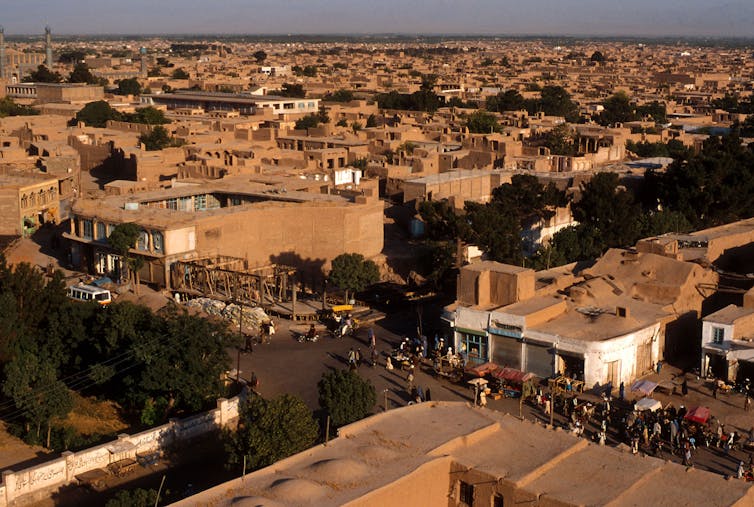This article will explain Islamic law, or Sharia, a core part of the faith, drawn from the Quran and the Hadith, a collection of the sayings and actions of the Prophet Muhammad and his companions.
Sharia constitutes a broad set of rules that guide Muslims on how to lead an ethical life. In Arabic, Sharia means "the way," as scholar Asma Afsaruddin explains. It is a way for many Muslims to get moral direction on their conduct, including how to pray and how to treat a family member.
Many Americans associate Sharia with intolerance. The media often plays up stories of primitive punishments under Sharia, such as caning or stoning to death for adultery.
Between 2010 and 2018, 43 U.S. states introduced bills with the aim to check any use of Islamic law in American courts. In 2017, "anti-Sharia" marches were organized across the U.S. by the a conservative group ACT for America to stop Sharia from making "inroads" into society.
The way Sharia is interpreted depends on who is using it and why. For example, Sharia has been used to restrict women's freedom in countries such as Brunei and Saudi Arabia. However, scholar Mark Fathi Massoud points out that Sharia provided women with rights that were unheard of in the premodern world.
Scholar Afsaruddin writes that Sharia requires a woman's consent before marriage. It also allows a woman to initiate divorce under certain conditions. It allowed a Muslim woman to inherit property at a time when European Christian women did not have such rights. 
Scholar Jessica Marglin connects this harsh interpretation to "Islamism," which arose in the 20th century.
"Islamists see revival of the Sharia as a political solution to the problems plaguing Muslim-majority societies, including corruption and inequality," writes Marglin.
While many Sharia punishments relate to issues of morality, Afsaruddin clarifies that Islam does take a strong position on adultery.
It's true that the Quran prescribes punishment by lashing. "But there is a high bar of evidence that must be met before this punishment can be meted out: Four witnesses must observe the actual act of penetration. Even in this age of voyeurism, it would be next to impossible to meet this criterion," she writes. Such a punishment was "hardly ever carried out in the premodern world," she adds.
Honor killings and female genital mutilation, often ascribed to Sharia, are in "fact non-Islamic tribal practices that have no basis in Sharia," writes Afsaruddin. In other words, they are cultural and not religious practices. Female genital mutilation is practiced by non-Muslims as well.
It's important to understand what led to these modern-day interpretations in a few countries like Saudi Arabia and Brunei. Massoud says that it was countries in which Muslim fundamentalists have gained power, such as Iran and Saudi Arabia, among others, that "stunted the democratic potential of Sharia."
During the colonial era, Great Britain, France and other European powers ruled over their colonies in the Middle East, Africa and Asia. Massoud's research shows that post-colonial Muslim societies, such as Sudan, Nigeria, Pakistan and Somalia, rejected the religious system and embraced the colonial legal system, leaving Sharia in the hands of extremists.
Today, the use of Sharia, he says, is often used to portray that "the Muslim world is uncivilized" and Islam "incompatible with modern society."
Further Reading and Resources:
- What Sharia means: 5 questions answered
- Harsh punishments under Sharia are modern interpretations of an ancient tradition
- Don't blame Sharia for Islamic extremism - blame colonialism
- SHARIAsource: This is a research initiative at Harvard Law School, and a great resource for teachers and scholars looking for information on Islamic law.
- Islamic Networks Group answers a series of commonly asked questions about Sharia in the U.S.![]()
The Conversation brings you a series of six articles that will explain Islam and its diversity and try to clear common misconceptions. They explore the history of American Muslims and gain a deeper understanding of their faith.
Kalpana Jain is the Senior Religion + Ethics Editor at The Conversation. She has worked as an editor, writer and researcher at Harvard University. She holds a Master in Theological Studies from Harvard Divinity School.
This article was reviewed by Jessica Marglin, Associate Professor of Religion at USC Dornsife College of Letters, Arts and Sciences.
( Source: This article is republished from The Conversation under a Creative Commons license. Read the original article. )